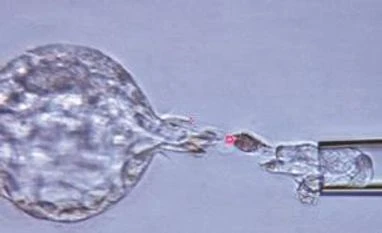That was two-and-a-half years ago, and one particular anxiety has been put to rest now. Swayamprabha delivered twin boys last month, on July 20, free of the hereditary cancer gene, in the first instance of this kind of medical intervention in India. There are only about 140 other such cases across the world.

Ever since she tested positive for the “cancer gene”, Swayamprabha has been taking multiple blood tests every six months to check for cancer. For two years after getting married in 2009, she could not decide if she wanted to conceive at all. “Our doctors in Bengaluru told us that science is improving and your child may not even get cancer till the age of 25, based on my medical history,” Swayamprabha recalls. However, after her miscarriages, the couple began losing hope as doctors suggested they wouldn’t be able to conceive naturally.

In vitro fertilisation, commonly known as IVF, is a 40-year-old technology that assists reproduction in cases where chances of doing so naturally are low. While the technology was developed to help infertile couples conceive, today it can be used to address genetic or hereditary disorders as well. Intra-Cytoplasmic Implantation (ICSI) along with Pre-Implantation Genetic Testing (PGT) gave Swayamprabha what she had been wishing for.
According to Parikh, the environment’s interaction with DNA in the human body has increased vulnerability to diseases such as cancer. While DNA is in a constant process of repair, the smallest mutation, a result of incorrect “repair”, can lead to mental and physical disorders. PGT becomes helpful in screening the embryo for genetic problems before the embryo is implanted in the uterus to decrease the burden of disease on the couple’s children.
The procedure yielded six blastocyst stage embryos. The Pre-PGT check-up conducted by Parikh allowed her to locate the exact spot in the chromosome where the mutation had taken place and a delicate biopsy of a few cells surrounding the embryo was performed by micromanipulation. These were then sent for genetic analysis. Two embryos were found healthy and free of BRAC1 mutation. These embryos were implanted in Swayamprabha’s uterus. She was first treated with hormones to obtain an adequate number of ova or eggs that were extracted under mild anesthesia. Using the ICSI technology, a single sperm was injected into the cytoplasm of each mature egg manually in the embryology laboratory under a special microscope, fitted with a micromanipulator and a laser. This was followed by incubation to allow fertilisation and formation of the embryo.
“One must use whatever technology one has today to offer the best health care possible,” says Parikh, of this seeming medical miracle. Of course, not everyone can afford the cost of miracles — the couple spent upwards of a few lakh of rupees to achieve this remarkable result.
To read the full story, Subscribe Now at just Rs 249 a month
Already a subscriber? Log in
Subscribe To BS Premium
₹249
Renews automatically
₹1699₹1999
Opt for auto renewal and save Rs. 300 Renews automatically
₹1999
What you get on BS Premium?
-
Unlock 30+ premium stories daily hand-picked by our editors, across devices on browser and app.
-
Pick your favourite companies, get a daily email with all news updates on them.
Full access to our intuitive epaper - clip, save, share articles from any device; newspaper archives from 2006.
Preferential invites to Business Standard events.
Curated newsletters on markets, personal finance, policy & politics, start-ups, technology, and more.
Need More Information - write to us at assist@bsmail.in



)